Implications of Le v Minister for Immigration [2019] FCCA 2167
VerifiedAdded on 2022/08/13
|9
|2245
|42
Case Study
AI Summary
This case study analyzes the implications of the Le v Minister for Immigration [2019] FCCA 2167 decision within the context of Australian migration law, specifically concerning Partner (Subclass 820 and 801) visas. The case examines the application of condition 8503 ("No further stay") on a visitor visa and its impact on the validity of a subsequent Partner visa application. The analysis explores the relevant sections of the Migration Act, including section 46(1A) regarding invalid visa applications and subsection 41(2A) concerning waivers of condition 8503. The document discusses the principles of statutory interpretation used by the judge, highlighting how the court applies legislative aspects to specific cases and controversies, ensuring justice in rulings. The study also references relevant legislation, regulations, and case law to support its findings, ultimately concluding the circumstances in which a waiver can be granted and the likelihood of denial in the case presented, emphasizing the importance of compassionate and compelling reasons.
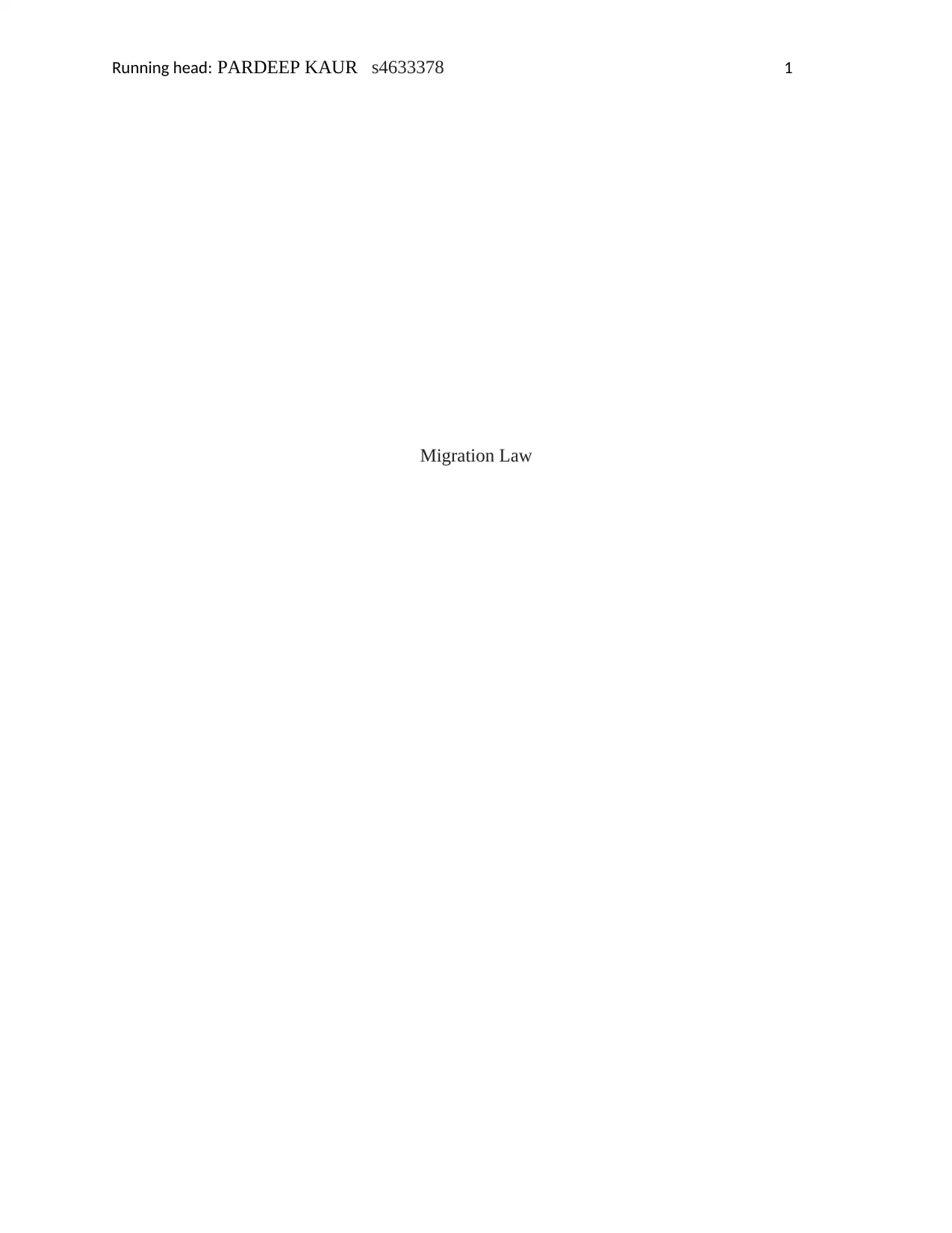
Running head: PARDEEP KAUR s4633378 1
Migration Law
Migration Law
Paraphrase This Document
Need a fresh take? Get an instant paraphrase of this document with our AI Paraphraser
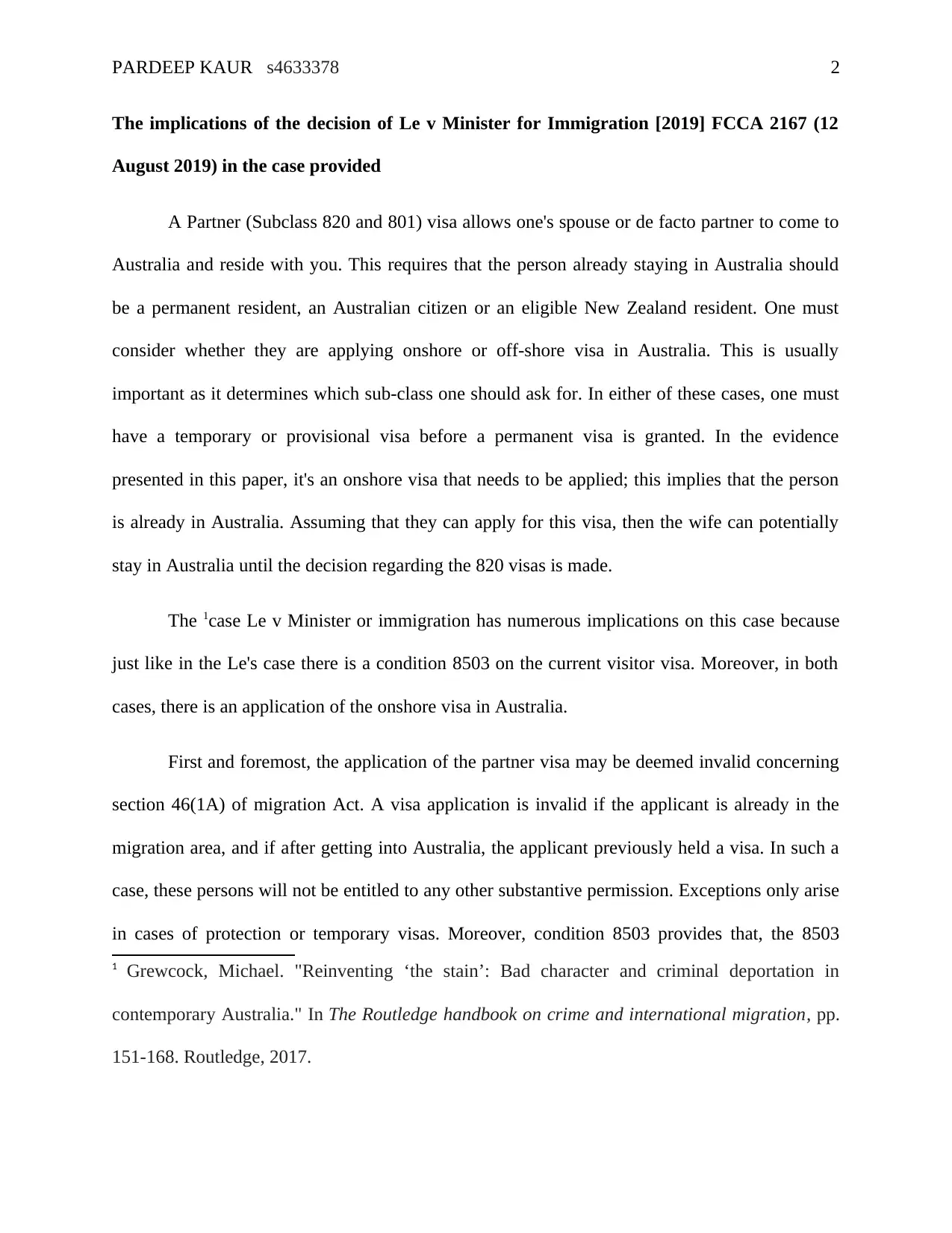
PARDEEP KAUR s4633378 2
The implications of the decision of Le v Minister for Immigration [2019] FCCA 2167 (12
August 2019) in the case provided
A Partner (Subclass 820 and 801) visa allows one's spouse or de facto partner to come to
Australia and reside with you. This requires that the person already staying in Australia should
be a permanent resident, an Australian citizen or an eligible New Zealand resident. One must
consider whether they are applying onshore or off-shore visa in Australia. This is usually
important as it determines which sub-class one should ask for. In either of these cases, one must
have a temporary or provisional visa before a permanent visa is granted. In the evidence
presented in this paper, it's an onshore visa that needs to be applied; this implies that the person
is already in Australia. Assuming that they can apply for this visa, then the wife can potentially
stay in Australia until the decision regarding the 820 visas is made.
The 1case Le v Minister or immigration has numerous implications on this case because
just like in the Le's case there is a condition 8503 on the current visitor visa. Moreover, in both
cases, there is an application of the onshore visa in Australia.
First and foremost, the application of the partner visa may be deemed invalid concerning
section 46(1A) of migration Act. A visa application is invalid if the applicant is already in the
migration area, and if after getting into Australia, the applicant previously held a visa. In such a
case, these persons will not be entitled to any other substantive permission. Exceptions only arise
in cases of protection or temporary visas. Moreover, condition 8503 provides that, the 8503
1 Grewcock, Michael. "Reinventing ‘the stain’: Bad character and criminal deportation in
contemporary Australia." In The Routledge handbook on crime and international migration, pp.
151-168. Routledge, 2017.
The implications of the decision of Le v Minister for Immigration [2019] FCCA 2167 (12
August 2019) in the case provided
A Partner (Subclass 820 and 801) visa allows one's spouse or de facto partner to come to
Australia and reside with you. This requires that the person already staying in Australia should
be a permanent resident, an Australian citizen or an eligible New Zealand resident. One must
consider whether they are applying onshore or off-shore visa in Australia. This is usually
important as it determines which sub-class one should ask for. In either of these cases, one must
have a temporary or provisional visa before a permanent visa is granted. In the evidence
presented in this paper, it's an onshore visa that needs to be applied; this implies that the person
is already in Australia. Assuming that they can apply for this visa, then the wife can potentially
stay in Australia until the decision regarding the 820 visas is made.
The 1case Le v Minister or immigration has numerous implications on this case because
just like in the Le's case there is a condition 8503 on the current visitor visa. Moreover, in both
cases, there is an application of the onshore visa in Australia.
First and foremost, the application of the partner visa may be deemed invalid concerning
section 46(1A) of migration Act. A visa application is invalid if the applicant is already in the
migration area, and if after getting into Australia, the applicant previously held a visa. In such a
case, these persons will not be entitled to any other substantive permission. Exceptions only arise
in cases of protection or temporary visas. Moreover, condition 8503 provides that, the 8503
1 Grewcock, Michael. "Reinventing ‘the stain’: Bad character and criminal deportation in
contemporary Australia." In The Routledge handbook on crime and international migration, pp.
151-168. Routledge, 2017.
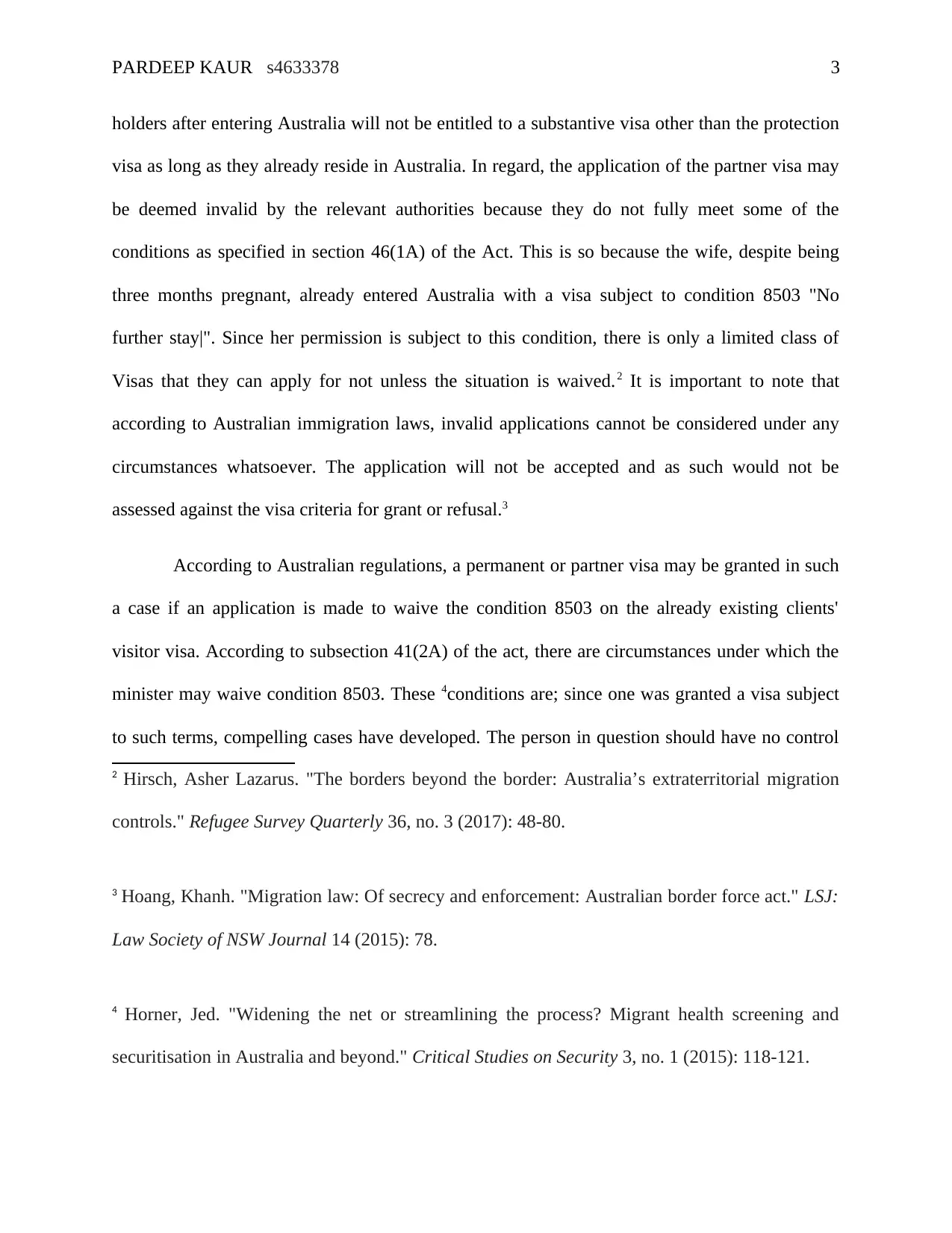
PARDEEP KAUR s4633378 3
holders after entering Australia will not be entitled to a substantive visa other than the protection
visa as long as they already reside in Australia. In regard, the application of the partner visa may
be deemed invalid by the relevant authorities because they do not fully meet some of the
conditions as specified in section 46(1A) of the Act. This is so because the wife, despite being
three months pregnant, already entered Australia with a visa subject to condition 8503 "No
further stay|". Since her permission is subject to this condition, there is only a limited class of
Visas that they can apply for not unless the situation is waived.2 It is important to note that
according to Australian immigration laws, invalid applications cannot be considered under any
circumstances whatsoever. The application will not be accepted and as such would not be
assessed against the visa criteria for grant or refusal.3
According to Australian regulations, a permanent or partner visa may be granted in such
a case if an application is made to waive the condition 8503 on the already existing clients'
visitor visa. According to subsection 41(2A) of the act, there are circumstances under which the
minister may waive condition 8503. These 4conditions are; since one was granted a visa subject
to such terms, compelling cases have developed. The person in question should have no control
2 Hirsch, Asher Lazarus. "The borders beyond the border: Australia’s extraterritorial migration
controls." Refugee Survey Quarterly 36, no. 3 (2017): 48-80.
3 Hoang, Khanh. "Migration law: Of secrecy and enforcement: Australian border force act." LSJ:
Law Society of NSW Journal 14 (2015): 78.
4 Horner, Jed. "Widening the net or streamlining the process? Migrant health screening and
securitisation in Australia and beyond." Critical Studies on Security 3, no. 1 (2015): 118-121.
holders after entering Australia will not be entitled to a substantive visa other than the protection
visa as long as they already reside in Australia. In regard, the application of the partner visa may
be deemed invalid by the relevant authorities because they do not fully meet some of the
conditions as specified in section 46(1A) of the Act. This is so because the wife, despite being
three months pregnant, already entered Australia with a visa subject to condition 8503 "No
further stay|". Since her permission is subject to this condition, there is only a limited class of
Visas that they can apply for not unless the situation is waived.2 It is important to note that
according to Australian immigration laws, invalid applications cannot be considered under any
circumstances whatsoever. The application will not be accepted and as such would not be
assessed against the visa criteria for grant or refusal.3
According to Australian regulations, a permanent or partner visa may be granted in such
a case if an application is made to waive the condition 8503 on the already existing clients'
visitor visa. According to subsection 41(2A) of the act, there are circumstances under which the
minister may waive condition 8503. These 4conditions are; since one was granted a visa subject
to such terms, compelling cases have developed. The person in question should have no control
2 Hirsch, Asher Lazarus. "The borders beyond the border: Australia’s extraterritorial migration
controls." Refugee Survey Quarterly 36, no. 3 (2017): 48-80.
3 Hoang, Khanh. "Migration law: Of secrecy and enforcement: Australian border force act." LSJ:
Law Society of NSW Journal 14 (2015): 78.
4 Horner, Jed. "Widening the net or streamlining the process? Migrant health screening and
securitisation in Australia and beyond." Critical Studies on Security 3, no. 1 (2015): 118-121.
⊘ This is a preview!⊘
Do you want full access?
Subscribe today to unlock all pages.

Trusted by 1+ million students worldwide
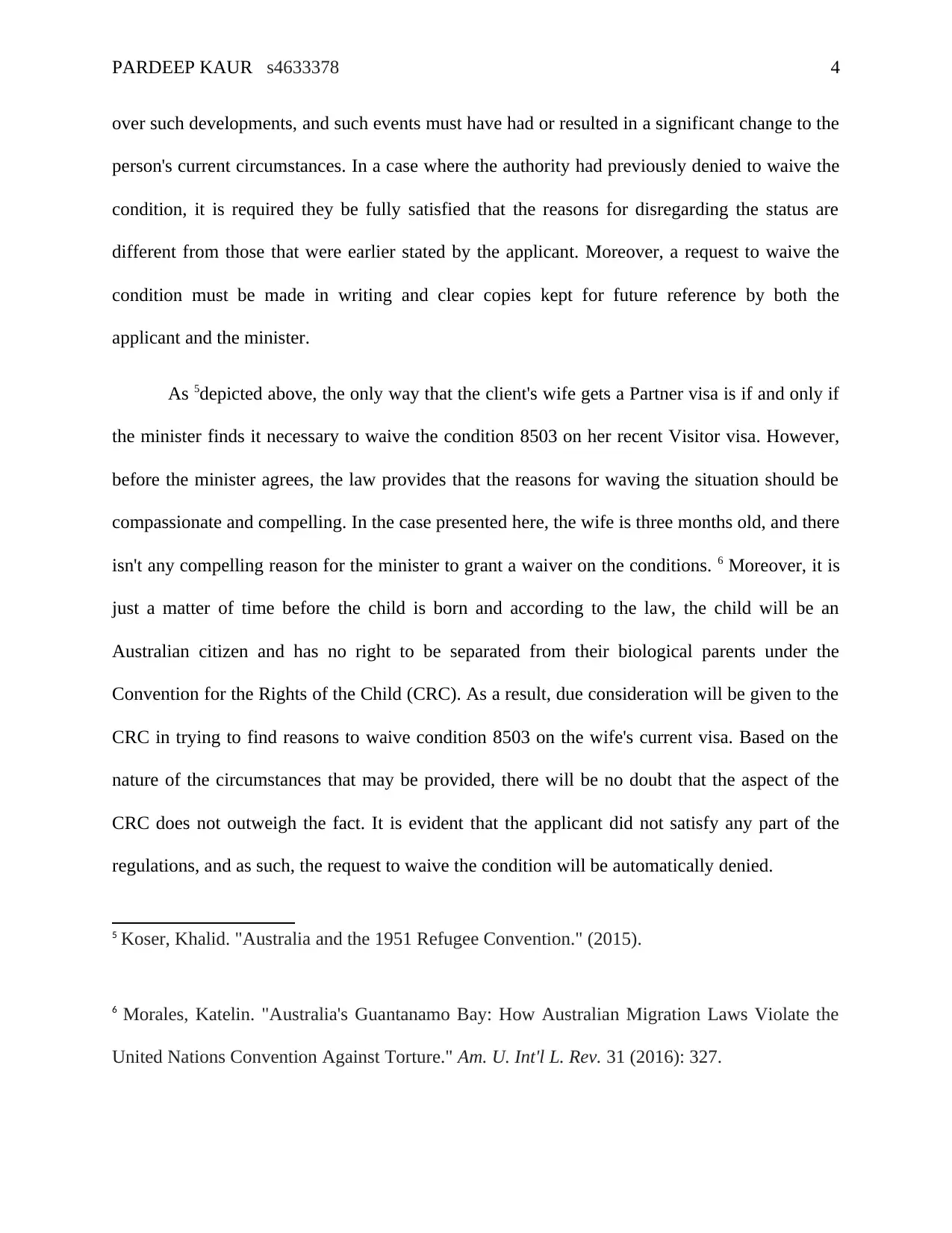
PARDEEP KAUR s4633378 4
over such developments, and such events must have had or resulted in a significant change to the
person's current circumstances. In a case where the authority had previously denied to waive the
condition, it is required they be fully satisfied that the reasons for disregarding the status are
different from those that were earlier stated by the applicant. Moreover, a request to waive the
condition must be made in writing and clear copies kept for future reference by both the
applicant and the minister.
As 5depicted above, the only way that the client's wife gets a Partner visa is if and only if
the minister finds it necessary to waive the condition 8503 on her recent Visitor visa. However,
before the minister agrees, the law provides that the reasons for waving the situation should be
compassionate and compelling. In the case presented here, the wife is three months old, and there
isn't any compelling reason for the minister to grant a waiver on the conditions. 6 Moreover, it is
just a matter of time before the child is born and according to the law, the child will be an
Australian citizen and has no right to be separated from their biological parents under the
Convention for the Rights of the Child (CRC). As a result, due consideration will be given to the
CRC in trying to find reasons to waive condition 8503 on the wife's current visa. Based on the
nature of the circumstances that may be provided, there will be no doubt that the aspect of the
CRC does not outweigh the fact. It is evident that the applicant did not satisfy any part of the
regulations, and as such, the request to waive the condition will be automatically denied.
5 Koser, Khalid. "Australia and the 1951 Refugee Convention." (2015).
6 Morales, Katelin. "Australia's Guantanamo Bay: How Australian Migration Laws Violate the
United Nations Convention Against Torture." Am. U. Int'l L. Rev. 31 (2016): 327.
over such developments, and such events must have had or resulted in a significant change to the
person's current circumstances. In a case where the authority had previously denied to waive the
condition, it is required they be fully satisfied that the reasons for disregarding the status are
different from those that were earlier stated by the applicant. Moreover, a request to waive the
condition must be made in writing and clear copies kept for future reference by both the
applicant and the minister.
As 5depicted above, the only way that the client's wife gets a Partner visa is if and only if
the minister finds it necessary to waive the condition 8503 on her recent Visitor visa. However,
before the minister agrees, the law provides that the reasons for waving the situation should be
compassionate and compelling. In the case presented here, the wife is three months old, and there
isn't any compelling reason for the minister to grant a waiver on the conditions. 6 Moreover, it is
just a matter of time before the child is born and according to the law, the child will be an
Australian citizen and has no right to be separated from their biological parents under the
Convention for the Rights of the Child (CRC). As a result, due consideration will be given to the
CRC in trying to find reasons to waive condition 8503 on the wife's current visa. Based on the
nature of the circumstances that may be provided, there will be no doubt that the aspect of the
CRC does not outweigh the fact. It is evident that the applicant did not satisfy any part of the
regulations, and as such, the request to waive the condition will be automatically denied.
5 Koser, Khalid. "Australia and the 1951 Refugee Convention." (2015).
6 Morales, Katelin. "Australia's Guantanamo Bay: How Australian Migration Laws Violate the
United Nations Convention Against Torture." Am. U. Int'l L. Rev. 31 (2016): 327.
Paraphrase This Document
Need a fresh take? Get an instant paraphrase of this document with our AI Paraphraser
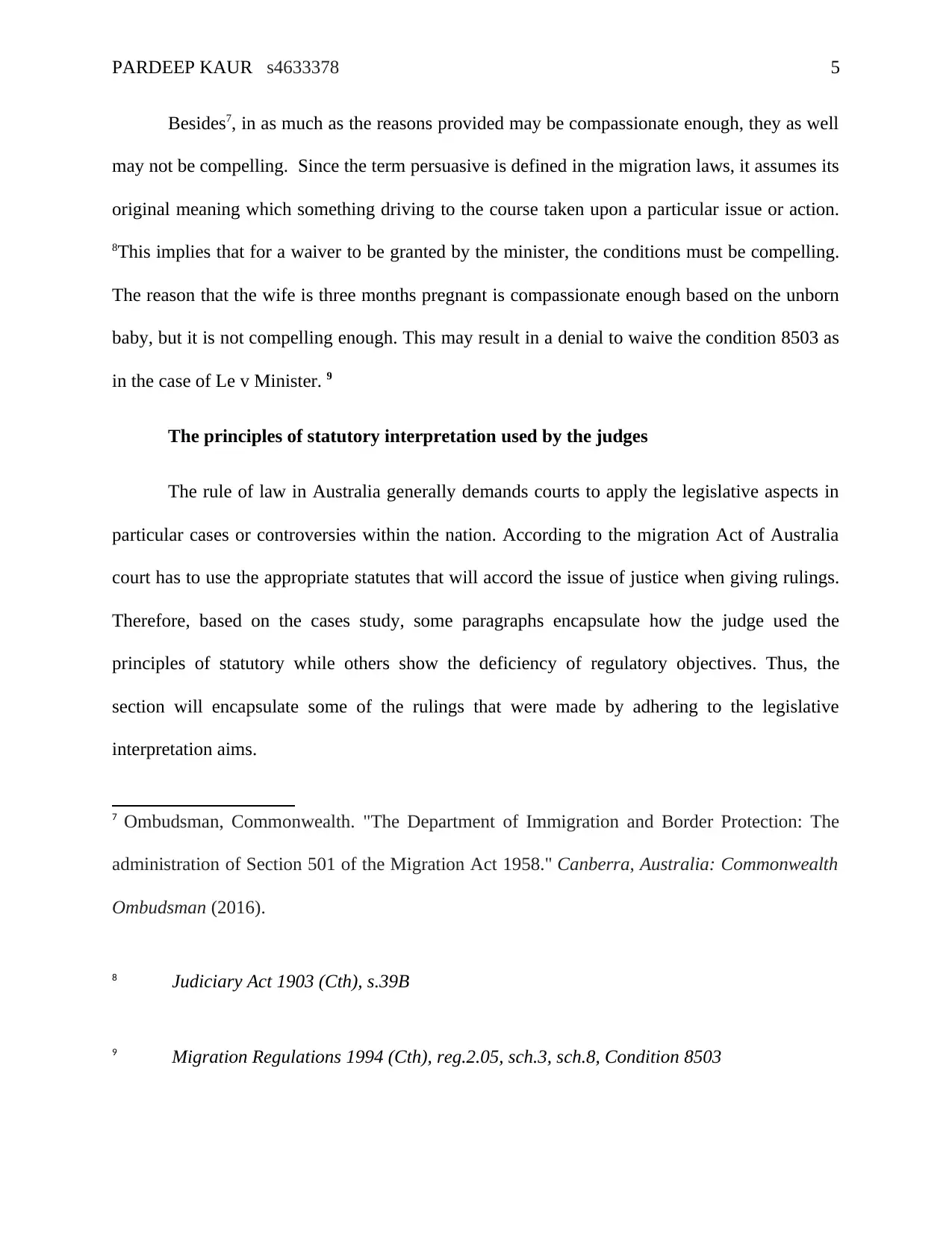
PARDEEP KAUR s4633378 5
Besides7, in as much as the reasons provided may be compassionate enough, they as well
may not be compelling. Since the term persuasive is defined in the migration laws, it assumes its
original meaning which something driving to the course taken upon a particular issue or action.
8This implies that for a waiver to be granted by the minister, the conditions must be compelling.
The reason that the wife is three months pregnant is compassionate enough based on the unborn
baby, but it is not compelling enough. This may result in a denial to waive the condition 8503 as
in the case of Le v Minister. 9
The principles of statutory interpretation used by the judges
The rule of law in Australia generally demands courts to apply the legislative aspects in
particular cases or controversies within the nation. According to the migration Act of Australia
court has to use the appropriate statutes that will accord the issue of justice when giving rulings.
Therefore, based on the cases study, some paragraphs encapsulate how the judge used the
principles of statutory while others show the deficiency of regulatory objectives. Thus, the
section will encapsulate some of the rulings that were made by adhering to the legislative
interpretation aims.
7 Ombudsman, Commonwealth. "The Department of Immigration and Border Protection: The
administration of Section 501 of the Migration Act 1958." Canberra, Australia: Commonwealth
Ombudsman (2016).
8 Judiciary Act 1903 (Cth), s.39B
9 Migration Regulations 1994 (Cth), reg.2.05, sch.3, sch.8, Condition 8503
Besides7, in as much as the reasons provided may be compassionate enough, they as well
may not be compelling. Since the term persuasive is defined in the migration laws, it assumes its
original meaning which something driving to the course taken upon a particular issue or action.
8This implies that for a waiver to be granted by the minister, the conditions must be compelling.
The reason that the wife is three months pregnant is compassionate enough based on the unborn
baby, but it is not compelling enough. This may result in a denial to waive the condition 8503 as
in the case of Le v Minister. 9
The principles of statutory interpretation used by the judges
The rule of law in Australia generally demands courts to apply the legislative aspects in
particular cases or controversies within the nation. According to the migration Act of Australia
court has to use the appropriate statutes that will accord the issue of justice when giving rulings.
Therefore, based on the cases study, some paragraphs encapsulate how the judge used the
principles of statutory while others show the deficiency of regulatory objectives. Thus, the
section will encapsulate some of the rulings that were made by adhering to the legislative
interpretation aims.
7 Ombudsman, Commonwealth. "The Department of Immigration and Border Protection: The
administration of Section 501 of the Migration Act 1958." Canberra, Australia: Commonwealth
Ombudsman (2016).
8 Judiciary Act 1903 (Cth), s.39B
9 Migration Regulations 1994 (Cth), reg.2.05, sch.3, sch.8, Condition 8503
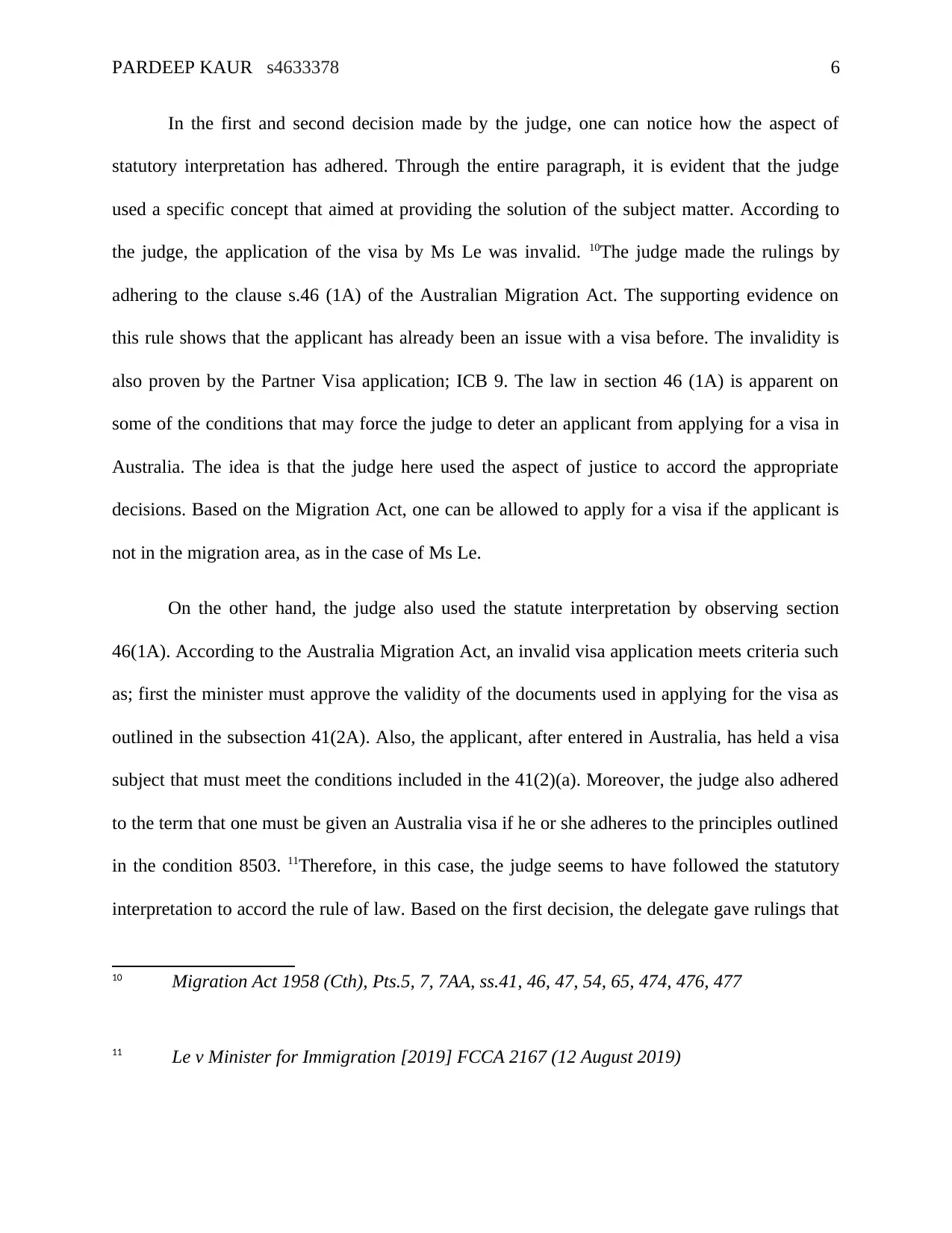
PARDEEP KAUR s4633378 6
In the first and second decision made by the judge, one can notice how the aspect of
statutory interpretation has adhered. Through the entire paragraph, it is evident that the judge
used a specific concept that aimed at providing the solution of the subject matter. According to
the judge, the application of the visa by Ms Le was invalid. 10The judge made the rulings by
adhering to the clause s.46 (1A) of the Australian Migration Act. The supporting evidence on
this rule shows that the applicant has already been an issue with a visa before. The invalidity is
also proven by the Partner Visa application; ICB 9. The law in section 46 (1A) is apparent on
some of the conditions that may force the judge to deter an applicant from applying for a visa in
Australia. The idea is that the judge here used the aspect of justice to accord the appropriate
decisions. Based on the Migration Act, one can be allowed to apply for a visa if the applicant is
not in the migration area, as in the case of Ms Le.
On the other hand, the judge also used the statute interpretation by observing section
46(1A). According to the Australia Migration Act, an invalid visa application meets criteria such
as; first the minister must approve the validity of the documents used in applying for the visa as
outlined in the subsection 41(2A). Also, the applicant, after entered in Australia, has held a visa
subject that must meet the conditions included in the 41(2)(a). Moreover, the judge also adhered
to the term that one must be given an Australia visa if he or she adheres to the principles outlined
in the condition 8503. 11Therefore, in this case, the judge seems to have followed the statutory
interpretation to accord the rule of law. Based on the first decision, the delegate gave rulings that
10 Migration Act 1958 (Cth), Pts.5, 7, 7AA, ss.41, 46, 47, 54, 65, 474, 476, 477
11 Le v Minister for Immigration [2019] FCCA 2167 (12 August 2019)
In the first and second decision made by the judge, one can notice how the aspect of
statutory interpretation has adhered. Through the entire paragraph, it is evident that the judge
used a specific concept that aimed at providing the solution of the subject matter. According to
the judge, the application of the visa by Ms Le was invalid. 10The judge made the rulings by
adhering to the clause s.46 (1A) of the Australian Migration Act. The supporting evidence on
this rule shows that the applicant has already been an issue with a visa before. The invalidity is
also proven by the Partner Visa application; ICB 9. The law in section 46 (1A) is apparent on
some of the conditions that may force the judge to deter an applicant from applying for a visa in
Australia. The idea is that the judge here used the aspect of justice to accord the appropriate
decisions. Based on the Migration Act, one can be allowed to apply for a visa if the applicant is
not in the migration area, as in the case of Ms Le.
On the other hand, the judge also used the statute interpretation by observing section
46(1A). According to the Australia Migration Act, an invalid visa application meets criteria such
as; first the minister must approve the validity of the documents used in applying for the visa as
outlined in the subsection 41(2A). Also, the applicant, after entered in Australia, has held a visa
subject that must meet the conditions included in the 41(2)(a). Moreover, the judge also adhered
to the term that one must be given an Australia visa if he or she adheres to the principles outlined
in the condition 8503. 11Therefore, in this case, the judge seems to have followed the statutory
interpretation to accord the rule of law. Based on the first decision, the delegate gave rulings that
10 Migration Act 1958 (Cth), Pts.5, 7, 7AA, ss.41, 46, 47, 54, 65, 474, 476, 477
11 Le v Minister for Immigration [2019] FCCA 2167 (12 August 2019)
⊘ This is a preview!⊘
Do you want full access?
Subscribe today to unlock all pages.

Trusted by 1+ million students worldwide
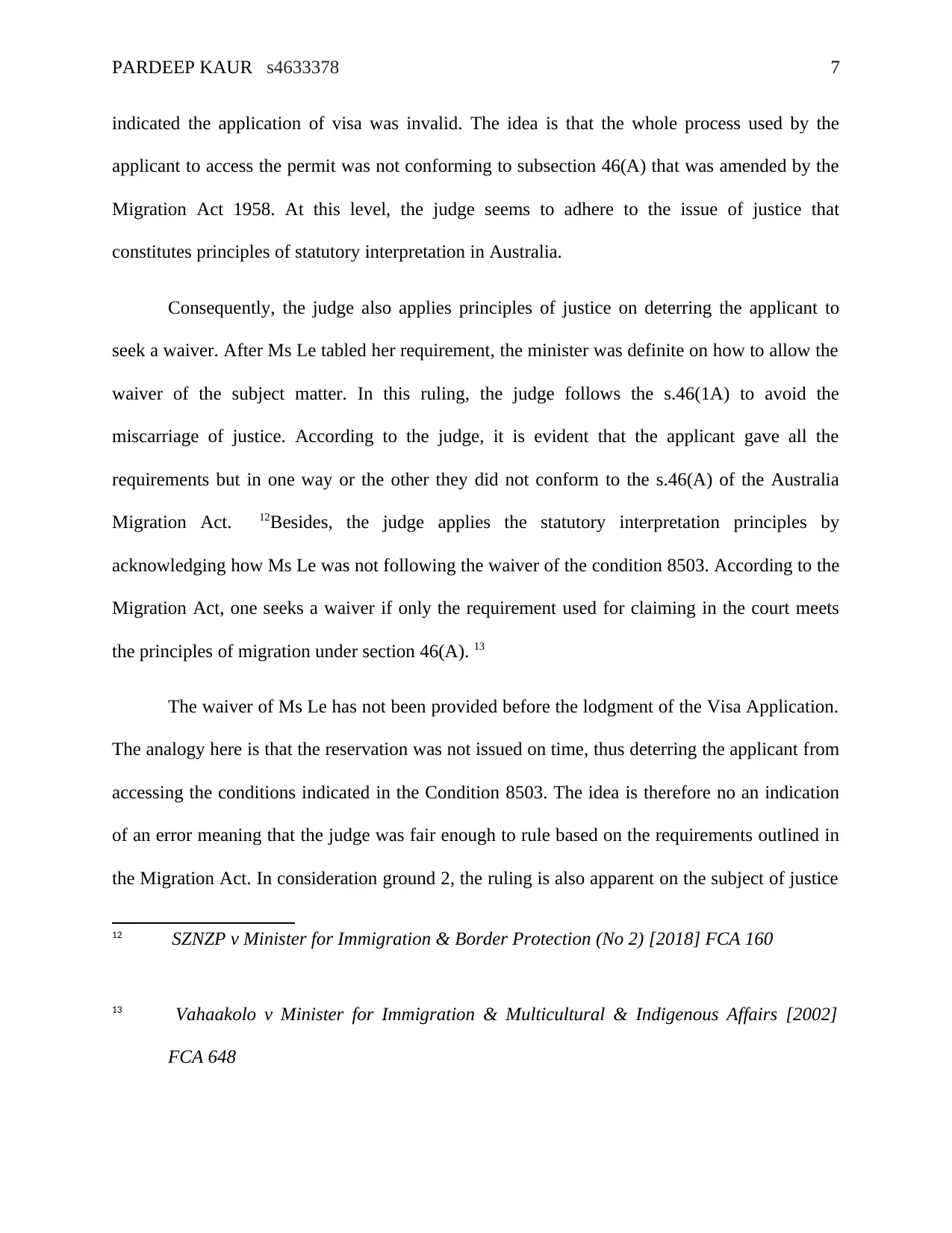
PARDEEP KAUR s4633378 7
indicated the application of visa was invalid. The idea is that the whole process used by the
applicant to access the permit was not conforming to subsection 46(A) that was amended by the
Migration Act 1958. At this level, the judge seems to adhere to the issue of justice that
constitutes principles of statutory interpretation in Australia.
Consequently, the judge also applies principles of justice on deterring the applicant to
seek a waiver. After Ms Le tabled her requirement, the minister was definite on how to allow the
waiver of the subject matter. In this ruling, the judge follows the s.46(1A) to avoid the
miscarriage of justice. According to the judge, it is evident that the applicant gave all the
requirements but in one way or the other they did not conform to the s.46(A) of the Australia
Migration Act. 12Besides, the judge applies the statutory interpretation principles by
acknowledging how Ms Le was not following the waiver of the condition 8503. According to the
Migration Act, one seeks a waiver if only the requirement used for claiming in the court meets
the principles of migration under section 46(A). 13
The waiver of Ms Le has not been provided before the lodgment of the Visa Application.
The analogy here is that the reservation was not issued on time, thus deterring the applicant from
accessing the conditions indicated in the Condition 8503. The idea is therefore no an indication
of an error meaning that the judge was fair enough to rule based on the requirements outlined in
the Migration Act. In consideration ground 2, the ruling is also apparent on the subject of justice
12 SZNZP v Minister for Immigration & Border Protection (No 2) [2018] FCA 160
13 Vahaakolo v Minister for Immigration & Multicultural & Indigenous Affairs [2002]
FCA 648
indicated the application of visa was invalid. The idea is that the whole process used by the
applicant to access the permit was not conforming to subsection 46(A) that was amended by the
Migration Act 1958. At this level, the judge seems to adhere to the issue of justice that
constitutes principles of statutory interpretation in Australia.
Consequently, the judge also applies principles of justice on deterring the applicant to
seek a waiver. After Ms Le tabled her requirement, the minister was definite on how to allow the
waiver of the subject matter. In this ruling, the judge follows the s.46(1A) to avoid the
miscarriage of justice. According to the judge, it is evident that the applicant gave all the
requirements but in one way or the other they did not conform to the s.46(A) of the Australia
Migration Act. 12Besides, the judge applies the statutory interpretation principles by
acknowledging how Ms Le was not following the waiver of the condition 8503. According to the
Migration Act, one seeks a waiver if only the requirement used for claiming in the court meets
the principles of migration under section 46(A). 13
The waiver of Ms Le has not been provided before the lodgment of the Visa Application.
The analogy here is that the reservation was not issued on time, thus deterring the applicant from
accessing the conditions indicated in the Condition 8503. The idea is therefore no an indication
of an error meaning that the judge was fair enough to rule based on the requirements outlined in
the Migration Act. In consideration ground 2, the ruling is also apparent on the subject of justice
12 SZNZP v Minister for Immigration & Border Protection (No 2) [2018] FCA 160
13 Vahaakolo v Minister for Immigration & Multicultural & Indigenous Affairs [2002]
FCA 648
Paraphrase This Document
Need a fresh take? Get an instant paraphrase of this document with our AI Paraphraser
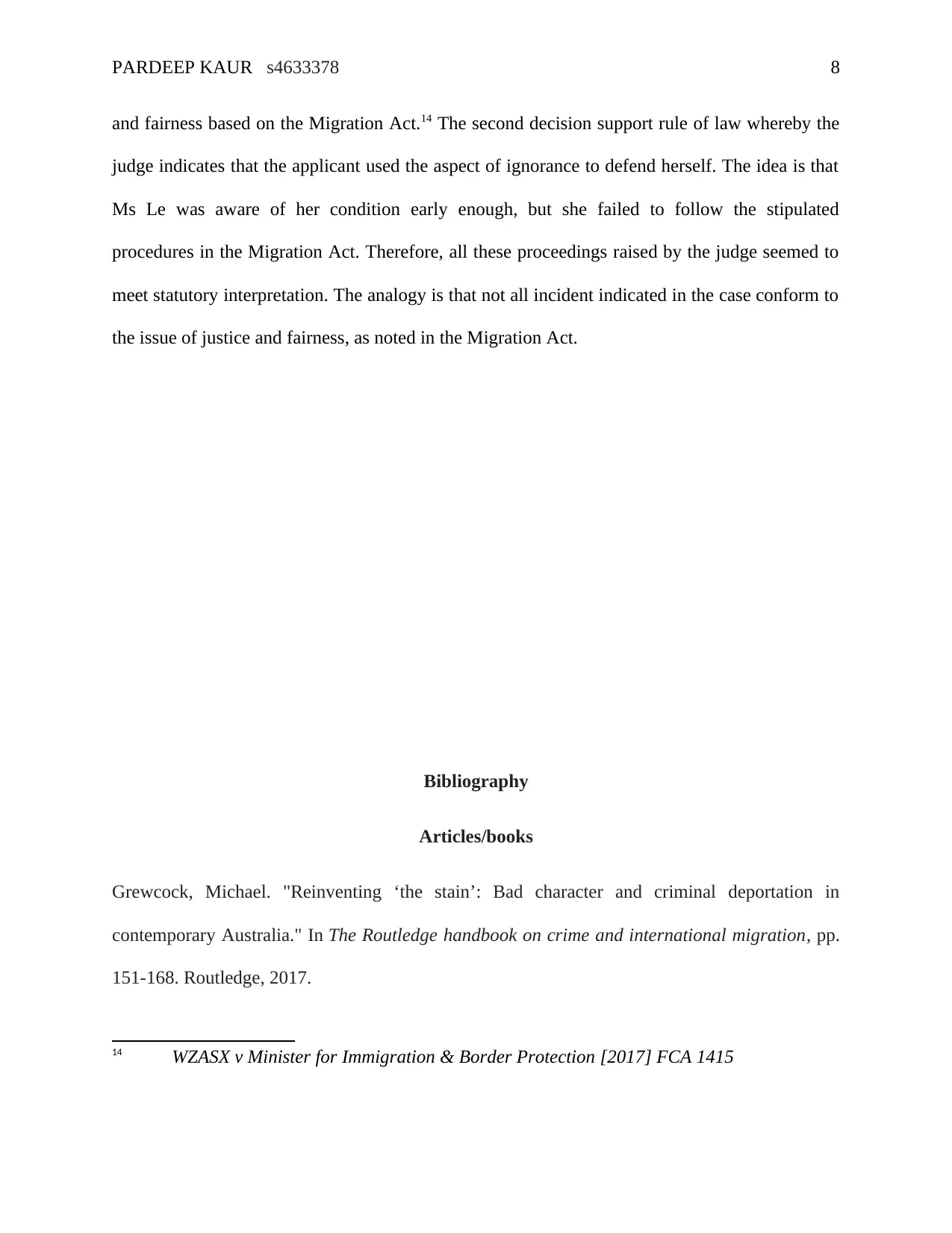
PARDEEP KAUR s4633378 8
and fairness based on the Migration Act.14 The second decision support rule of law whereby the
judge indicates that the applicant used the aspect of ignorance to defend herself. The idea is that
Ms Le was aware of her condition early enough, but she failed to follow the stipulated
procedures in the Migration Act. Therefore, all these proceedings raised by the judge seemed to
meet statutory interpretation. The analogy is that not all incident indicated in the case conform to
the issue of justice and fairness, as noted in the Migration Act.
Bibliography
Articles/books
Grewcock, Michael. "Reinventing ‘the stain’: Bad character and criminal deportation in
contemporary Australia." In The Routledge handbook on crime and international migration, pp.
151-168. Routledge, 2017.
14 WZASX v Minister for Immigration & Border Protection [2017] FCA 1415
and fairness based on the Migration Act.14 The second decision support rule of law whereby the
judge indicates that the applicant used the aspect of ignorance to defend herself. The idea is that
Ms Le was aware of her condition early enough, but she failed to follow the stipulated
procedures in the Migration Act. Therefore, all these proceedings raised by the judge seemed to
meet statutory interpretation. The analogy is that not all incident indicated in the case conform to
the issue of justice and fairness, as noted in the Migration Act.
Bibliography
Articles/books
Grewcock, Michael. "Reinventing ‘the stain’: Bad character and criminal deportation in
contemporary Australia." In The Routledge handbook on crime and international migration, pp.
151-168. Routledge, 2017.
14 WZASX v Minister for Immigration & Border Protection [2017] FCA 1415
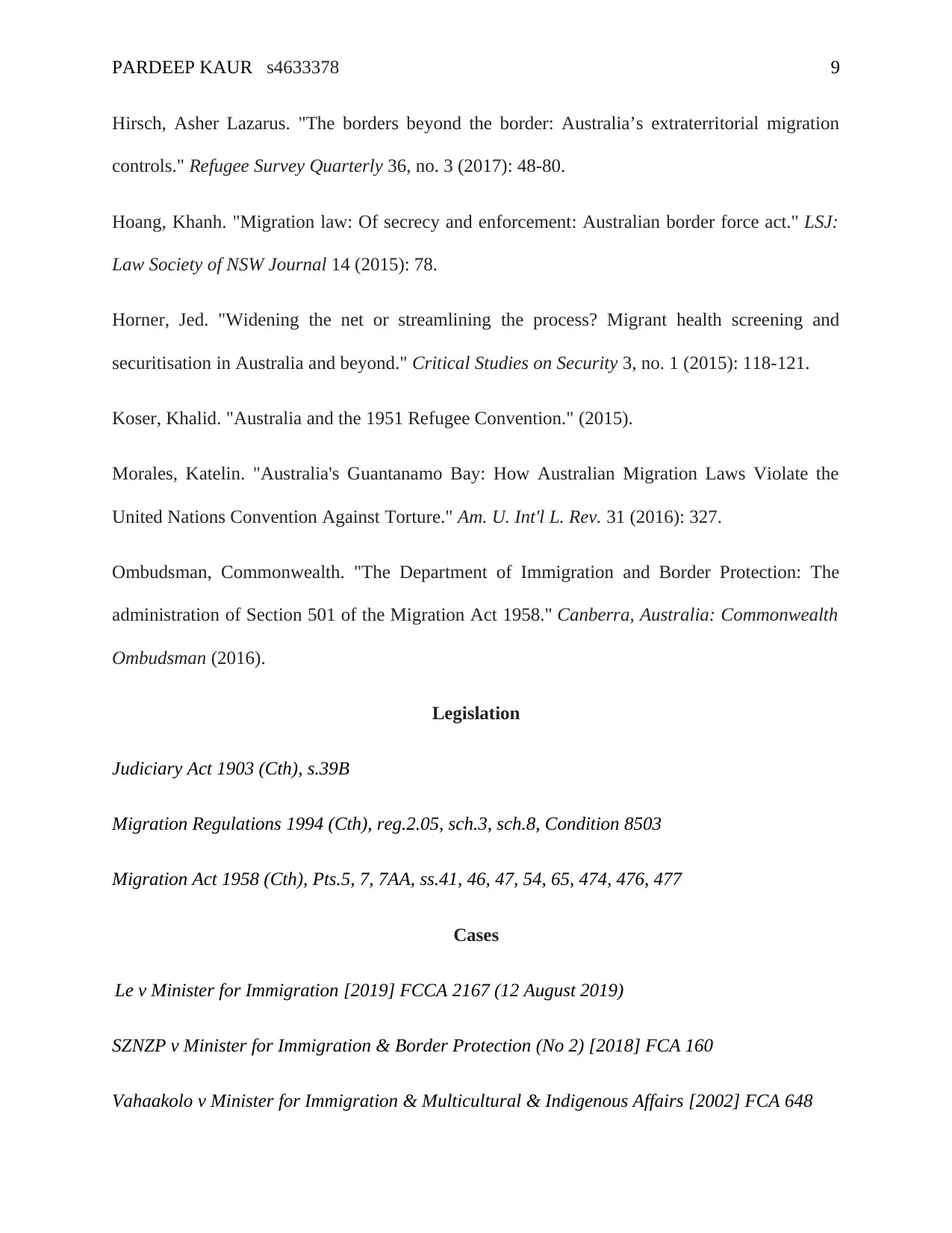
PARDEEP KAUR s4633378 9
Hirsch, Asher Lazarus. "The borders beyond the border: Australia’s extraterritorial migration
controls." Refugee Survey Quarterly 36, no. 3 (2017): 48-80.
Hoang, Khanh. "Migration law: Of secrecy and enforcement: Australian border force act." LSJ:
Law Society of NSW Journal 14 (2015): 78.
Horner, Jed. "Widening the net or streamlining the process? Migrant health screening and
securitisation in Australia and beyond." Critical Studies on Security 3, no. 1 (2015): 118-121.
Koser, Khalid. "Australia and the 1951 Refugee Convention." (2015).
Morales, Katelin. "Australia's Guantanamo Bay: How Australian Migration Laws Violate the
United Nations Convention Against Torture." Am. U. Int'l L. Rev. 31 (2016): 327.
Ombudsman, Commonwealth. "The Department of Immigration and Border Protection: The
administration of Section 501 of the Migration Act 1958." Canberra, Australia: Commonwealth
Ombudsman (2016).
Legislation
Judiciary Act 1903 (Cth), s.39B
Migration Regulations 1994 (Cth), reg.2.05, sch.3, sch.8, Condition 8503
Migration Act 1958 (Cth), Pts.5, 7, 7AA, ss.41, 46, 47, 54, 65, 474, 476, 477
Cases
Le v Minister for Immigration [2019] FCCA 2167 (12 August 2019)
SZNZP v Minister for Immigration & Border Protection (No 2) [2018] FCA 160
Vahaakolo v Minister for Immigration & Multicultural & Indigenous Affairs [2002] FCA 648
Hirsch, Asher Lazarus. "The borders beyond the border: Australia’s extraterritorial migration
controls." Refugee Survey Quarterly 36, no. 3 (2017): 48-80.
Hoang, Khanh. "Migration law: Of secrecy and enforcement: Australian border force act." LSJ:
Law Society of NSW Journal 14 (2015): 78.
Horner, Jed. "Widening the net or streamlining the process? Migrant health screening and
securitisation in Australia and beyond." Critical Studies on Security 3, no. 1 (2015): 118-121.
Koser, Khalid. "Australia and the 1951 Refugee Convention." (2015).
Morales, Katelin. "Australia's Guantanamo Bay: How Australian Migration Laws Violate the
United Nations Convention Against Torture." Am. U. Int'l L. Rev. 31 (2016): 327.
Ombudsman, Commonwealth. "The Department of Immigration and Border Protection: The
administration of Section 501 of the Migration Act 1958." Canberra, Australia: Commonwealth
Ombudsman (2016).
Legislation
Judiciary Act 1903 (Cth), s.39B
Migration Regulations 1994 (Cth), reg.2.05, sch.3, sch.8, Condition 8503
Migration Act 1958 (Cth), Pts.5, 7, 7AA, ss.41, 46, 47, 54, 65, 474, 476, 477
Cases
Le v Minister for Immigration [2019] FCCA 2167 (12 August 2019)
SZNZP v Minister for Immigration & Border Protection (No 2) [2018] FCA 160
Vahaakolo v Minister for Immigration & Multicultural & Indigenous Affairs [2002] FCA 648
⊘ This is a preview!⊘
Do you want full access?
Subscribe today to unlock all pages.

Trusted by 1+ million students worldwide
1 out of 9
Related Documents
Your All-in-One AI-Powered Toolkit for Academic Success.
+13062052269
info@desklib.com
Available 24*7 on WhatsApp / Email
![[object Object]](/_next/static/media/star-bottom.7253800d.svg)
Unlock your academic potential
Copyright © 2020–2026 A2Z Services. All Rights Reserved. Developed and managed by ZUCOL.
![Analysis of the Migration Law Case: Le v Minister [2019]](/_next/image/?url=https%3A%2F%2Fdesklib.com%2Fmedia%2Fimages%2Frl%2F780402c184b2449aadc282a97825b399.jpg&w=256&q=75)




